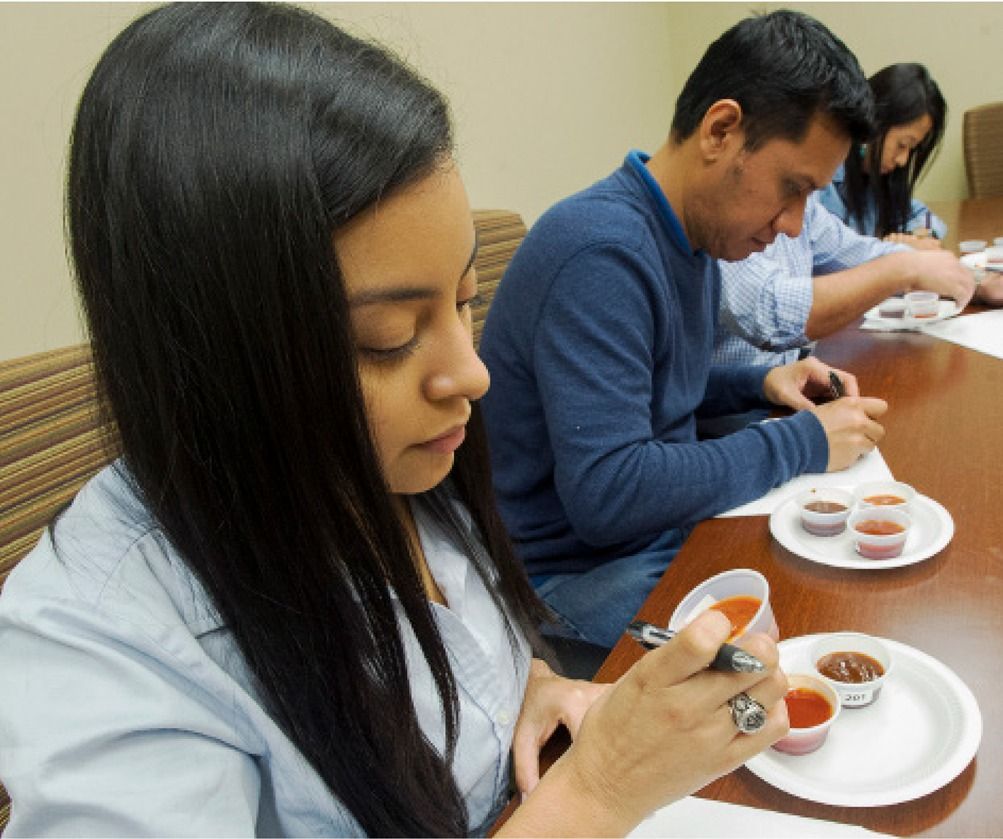LSU's Tiger Tasters
Taste may very well be the most important sense to a Louisianian.
We hold our cuisine in the utmost regard, and this draws people here who aren't convinced that the "Cajun," "Creole," "Bourbon Street," or "New Orleans"-themed restaurants found around the world bear the true flavor found here.
Our refined palate is the perfect testing ground for many food products that go through the Sensory Services Lab on LSU's campus. This intriguing lab invites everyday citizens, called "Tiger Tasters," to sample foods and give their opinions so that food makers know what's hot and what's not.
"There are different components of the Sensory Services Lab," said Lab Manager/LSU AgCenter FOODii Assistant Director Ashley Gutierrez. "The Sensory Services Lab is a service that we offer to food companies as part of the Food Innovation Institute (FOODii) and a part of the School of Nutrition and Food Science to help food companies if they want to launch a new product, want to change an ingredient, or have an established brand and want to see if consumers can tell a difference between products. So we can test that."
The staff, composed of Dr. Witoon Prinyawiwatkul, Ashley Gutierrez, and Dr. Yupeng Gao, conducts tests for a variety of food products for students, local companies, and even international companies using a roster of about 1,000 Tiger Tasters. Gutierrez explained the process, "We bring people in, and we'll do surveys, taste the product, and answer questions. Then Dr. Yupeng does an analysis of the data. We give a report to the company. So you can see if the consumer would buy the product, how much would they pay, if they don't like the product, what don't they like about it. It helps companies make informed decisions."
"Also, students research here," Dr. Yupeng continued. "They have a new project, and they need a lot of people to do a consumer study to publish a paper. So sometimes you see something really new, like insect cookies or gluten-free bread."

The Sensory Services Lab grew organically beginning in 1996 out of Dr. Prinyawiwatkul's work in sensory analysis and consumer perception; companies large and small sought out the lab to get insight into their products. The space required to fulfill the demand required a larger building, which was completed in 2014. The Sensory Services Lab takes up several rooms used for various purposes all in support of the food industry.
"We can provide service to industry at a larger scale. The purpose is to first help the food industry. We want to help small companies when they have a recipe from grandma like barbecue sauce. When you make the product, you want to know if consumers like it, if they would buy it, if they're eating it. So this is the beginning," Dr. Prinyawiwatkul elaborated as he wound through the demonstration kitchen, tasting room, focus group room, and commercial kitchen outfitted with everyday kitchen equipment and high-tech scientific instruments that measure texture, viscosity, water content, and more.
Gutierrez also pointed out the "electronic tongue." "It can measure senses like bitterness, sourness, saltiness, and you can actually correlate values here with consumer perception. It will give you a number, but it won't tell you if someone likes it. And that's why consumer testing is so important. Machines won't tell you that."
A typical project involves discussions with food companies on what information they're seeking to form the questionnaire that the Tiger Tasters will undergo while sampling. Tiger Tasters are recruited to visit the lab, where they sit in a specially-designed room to receive their samples. The room is lined with cubicles outfitted with a computer screen, where they fill in the questionnaire. The room has a negative air circulation system that removes scents from the samples and keeps cooking aromas from other areas out.
After completing the initial consent forms, samples are provided through an opening in the cubicle to decrease distractions, and the participants are asked various questions about what they're tasting. "It's a lot of fun working with all the different projects and seeing consumer reactions. People get really passionate about participating in our program, and they're really excited to come and give their feedback because they realize it's helping companies make decisions," said Gutierrez. "They have an impact on what goes onto store shelves. We can't share what the product is or what the company is, but they love to give feedback."
The resulting information is passed along to the companies to help them make decisions about their products, but the Sensory Services Lab stops their work here. "What we don't do is make recommendations. It's not our job. Here are the results—the consumers like it, they will buy it for this price. We are not making recommendations like, 'You should launch this product,'" said Dr. Prinyawiwatkul.
The lab stays busy between student and commercial projects, and all kinds of foods have been meticulously tested by willing participants. Dr. Yupeng listed some of the subjects, "Steaks, sausage, bacon. We have fish, deep fried stuff, raw fish, crab, coffee, orange juice, milk. We just had a gummy bear study." Louisiana-owned companies that produce items including king cakes and hot sauce prefer to use this lab so that they can gauge their products by the discerning Louisiana palate.
The Sensory Services Lab is always seeking more Tiger Tasters for the roster. Those willing to lend their discerning tastes are welcome to sign up at lsu.qualtrics.com/jfe/form/SV_3FeEyuuhkStqy57.

